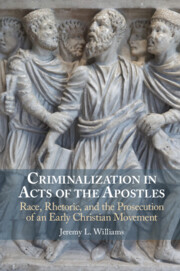 Criminalization in Acts of the Apostles
Criminalization in Acts of the Apostles Book contents
- Criminalization in Acts of the Apostles
- Criminalization in Acts of the Apostles
- Copyright page
- Dedication
- Contents
- Figures
- Acknowledgements
- Abbreviations
- Introduction
- Part I
- Part II
- 4 “I am a Human”
- 5 “Before the Court” and the Confines of Judicial Structures in Acts and Callirhoe
- 6 “The Foundation of the Prison Shook” and the Critical Analysis of Apollo’s, Dionysus’, and Acts’ Myths
- 7 “Not Lawful for Romans” and the Commitments of Roman Elites in Acts
- Epilogue
- Bibliography
- Ancient Sources Index
- Modern Author Index
- Subject Index
6 - “The Foundation of the Prison Shook” and the Critical Analysis of Apollo’s, Dionysus’, and Acts’ Myths
from Part II
Published online by Cambridge University Press: 12 October 2023
- Criminalization in Acts of the Apostles
- Criminalization in Acts of the Apostles
- Copyright page
- Dedication
- Contents
- Figures
- Acknowledgements
- Abbreviations
- Introduction
- Part I
- Part II
- 4 “I am a Human”
- 5 “Before the Court” and the Confines of Judicial Structures in Acts and Callirhoe
- 6 “The Foundation of the Prison Shook” and the Critical Analysis of Apollo’s, Dionysus’, and Acts’ Myths
- 7 “Not Lawful for Romans” and the Commitments of Roman Elites in Acts
- Epilogue
- Bibliography
- Ancient Sources Index
- Modern Author Index
- Subject Index
Summary
In this study, Jeremy L. Williams interrogates the book of Acts in an effort to understand how early Christian texts provide glimpses of the legal processes by which Roman officials and militarized police criminalized, prosecuted, and incarcerated people in the first and second centuries CE. Williams investigates how individuals and groups have been, and still are, prosecuted for specious reasons – because of stories and myths written against them, perceptions of alterity that render them subhuman or nonhuman, the collision of officials, and financial incentives that foster injustices, among them. Through analysis of criminalization in Acts, he demonstrates how critical race theory, Black studies, and feminist rhetorical scholarship enable a reconstruction of ancient understandings of crime, judicial institutions, militarized police, punishment, and sociopolitical processes that criminalize. Williams’ study highlights how the criminalization of Jesus’ followers as depicted in Acts enables connections with contemporary movements. It also presents the ancient text as a critique against the shortcomings of some contemporary understandings of justice and human rights.
- Type
- Chapter
- Information
- Criminalization in Acts of the ApostlesRace, Rhetoric, and the Prosecution of an Early Christian Movement, pp. 144 - 171Publisher: Cambridge University PressPrint publication year: 2023
